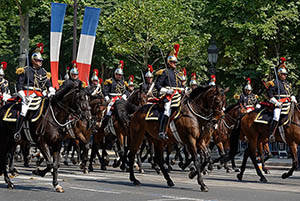War risk insurance in France
 The French market has more or less followed the same approach as that adopted across the Channel.
The French market has more or less followed the same approach as that adopted across the Channel.
Since the beginning of the 20th century, the French authorities have progressively taken over the war risks of shipowners through a direct insurance system involving the coverage of the State.
Before the First World War, the system put in place was purely optional. Shipowners were free to insure or not their risks, which insurers were also free to cover or not. The intervention of the State was evident as early as 1914, the year of the creation of the Executive Commission for Purchases and Transport by Sea. Its role was to provide the market with additional capacity to cover, firstly, the ships' hulls and, a few years later, the cargoes.
With the massive losses and destruction of ships during the First World War, war risk insurance with a state coverage became compulsory for shipowners in 1917. Consequently, the law of 19 April 1917 established the obligation to insure war risks with the State for ships of more than 500 tons. Shipowners could continue to insure themselves on the private market for ships of less than 500 tons.
The objective of this law was to spread the risk over a larger number of operators and to reduce the premiums, which had become too high.
Once peace restored, this exceptional system, set up to deal with exceptional circumstances linked to the war, was abandoned in 1919.
During the Second World War, the same principle was applied as of 1939.
In 1945, a war insurance department was set up, providing insurers with the possibility to cover their direct underwriting through reinsurance treaties concluded with the State.
The end of the Second World War marked a real turning point in war risk insurance programs. Insurance companies regained their freedom to underwrite, while the public authorities gradually withdrew from this sector in favor of specific funds (pools, funds, etc.) to which insurance companies interested in this risk could adhere.
In 1963, the State authorized the Ministry of Finance to carry out reinsurance or insurance operations to guarantee damages due to foreign or civil war, attacks on public order or popular unrest.
From the mid-1960s onwards, war risks and similar risks were legally excluded from property insurance policies, except if otherwise stipulated by special agreement.
The year 1967 marked a turning point in the insurance of war risks in France. A new legislative provision introduced an exclusion of war risks from insurance policies. This exclusion rule remains supplementary. Insurers could, at the request of their policyholders, cover the risks excluded by the law. Direct insurance companies were also given the freedom to reinsure these exceptional risks.
 The withdrawal of the State became effective in 1973. The reinsurance of war risks was then taken over by the Caisse Centrale de Réassurance, replacing the Ministry of Finance. Created in 1946, the CCR is authorized, with the coverage of the State, to carry out insurance or reinsurance operations for risks resulting from exceptional events, such as a state of foreign or civil war. (Article L 431-4 of the Insurance Code).
The withdrawal of the State became effective in 1973. The reinsurance of war risks was then taken over by the Caisse Centrale de Réassurance, replacing the Ministry of Finance. Created in 1946, the CCR is authorized, with the coverage of the State, to carry out insurance or reinsurance operations for risks resulting from exceptional events, such as a state of foreign or civil war. (Article L 431-4 of the Insurance Code).
By virtue of paragraph 12 of the same article, the CCR now has a monopoly on the reinsurance of war risks.
In 1976, insurers extended the coverage for risks of foreign war, civil war, riots, popular movements, acts of terrorism and sabotage to the fire damage, accident and miscellaneous risks businesses. This extension is subject to the payment of an additional premium and to a 7-day notice of cancellation.
In 1978, coverage for "all damage resulting from riots, popular movements, acts of terrorism and sabotage" became mandatory for industrial risks.
In 1980, the standard comprehensive homeowners’ insurance policy provided facultative coverage for fire and explosion damage resulting from riots, popular movements, acts of terrorism and concerted sabotage.
In 1983, a specific provision stipulates that all fire insurance contracts must cover, for a separate premium if necessary, the risks of direct material damage resulting from fire or explosions caused by attacks, whether riots, popular movements, acts of terrorism or concerted sabotage.
Subsequently, the 1986 law systematically extended the legal coverage of property damage to damage caused by attacks or acts of terrorism. This coverage does not cover immaterial damages and bodily injuries. Compensation for bodily injury is provided through a coverage fund financed by a levy on property damage insurance contracts.
The law of 31 December 1989 repeals article 431 of 1973. The obligation to reinsure with the CCR was cancelled and insurance companies are now free to retain the war risk or to cede it to the CCR or to other reinsurers.
The existing regime distinguishes between damages resulting from an act of war and those resulting from a terrorist attack.
In France, the exclusion of war risks from insurance contracts is therefore the rule and its coverage is the exception.
Considered as an exceptional risk, war risks are covered by special agreements in addition to ordinary risk policies. They are generally underwritten by specialized insurance organizations, set up as a pool such as Garex.
Read also | UK war risk insurance
Groupement d'Assurance de Risques Exceptionnels, Garex
Founded in 1980, the Groupement d'Assurance de Risques Exceptionnels (Garex) is specialized in the coverage of marine and related war risks. Its members include Axa, Allianz, CCR Re, Generali, helvetia, Mapfre and Scor. It is endowed with a large underwriting and compensation capacity.
Garex covers foreign war, civil war, capture, seizure, arrest or detention, piracy of a political nature or related to war, strikes, riots and civil unrest, confiscation, expropriation, nationalization, dispossession, mines, torpedoes, bombs or any other abandoned weapons, sabotage and terrorism, and attacks.
These risks pertain to ship's hull and cargo according to the Waterborne or Airborne clauses and the movable or mobile goods, including on land.
In direct insurance, the bulk of the portfolio comes from Asia and Europe. In reinsurance, Garex participates in all national pools (Hellenic War pool, Den Norske Forsikring, Japanese War pool, AWRIS) as well as the Group of War Risks Associations.
Read also | History of war risks insurance